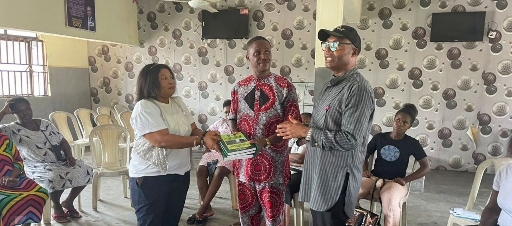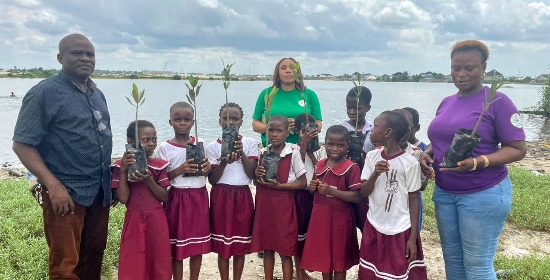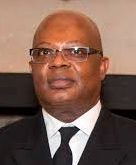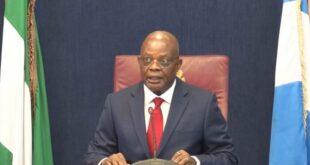By Kelechi Nwaucha
By Kelechi Nwaucha
Despite the devastation brought on the Niger Delta environment by decades of oil exploration activities, mangroves remain effective natural defense against climate change manifestations in the region.
According to research findings, mangroves, indigenous to the Niger Delta, “are one of nature’s most effective tools in the fight against climate change,” and contribute to the promotion of a sustainable ecosystem.
Against this backdrop, non-governmental organisation, Kebetkache Women Development and Resource Centre, with support from Both ENDS, recently embarked on the regeneration of 5,000 propagules (mangrove seedlings) in five riverine communities.
The project, which began with the regeneration of 1,000 propagules in Ibaka community, in Okrika Local Government Area of Rivers State, last Friday, is to traverse four other riverine communities, that include Bundu (Port Harcourt City LGA), Rumulumini (Obio//Akpor LGA) and Bodo (Gokana LGA).
Project officer at Kebetkache Women Development and Resource Centre, Dr. Confidence Otikor Samuel, who spoke on behalf of the executive director, Dr. Emem Okon, noted that “there is a need to conserve the mangrove. There is a need to protect it and preserve it, especially considering the economic impact of the mangrove in terms of food security and in terms of the medicinal aspect. A lot of us aren’t aware that it has medicinal impact.
“Also, during the erosion period, the mangrove helped to assuage the effect of erosion on the environment. So it is very, very important. And that is why Kebetkache is creating awareness and encouraging communities to replant (mangrove) if they must use.”
Explaining the vision behind Kebetkache’s 5,000 propagules project, Dr Samuel said “In the nearest future we wish to see a community where they are able to create a balance. Because the whole idea in conservation is all about use in a planned and sustainable manner, so that the future generation can also benefit from that usage.
“We want to see communities where the mangrove will not just be depleted, go into extinction. We are looking at the ability to conserve the mangrove ecosystem and for it to be sustainable. So that other generations can also have something to fall back to,” she said.
She said Ibaka is the first community Kebetkache is visiting for the mangrove regeneration project, adding that “Bundu is there, Rumulumini is there, and Bodo is there. So it’s an ongoing process. We are just starting with Ibaka.
“We are preaching this message that every person should come to the realization that the mangrove is very important to us. And then the need for us to really be aware that if we continue to degrade it, that it will have an aftermath effect on the community.”
Dr Samuel drew attention to the impact of mangrove on the lives of women in the community, noting that “when the mangrove is serving it’s natural purpose, women’s livelihood will be better.”
The event further offered Kebetkache the opportunity of educating the Ibaka women on mangrove conservation, as well as setting up a ‘Mangroves Conversation Club’ in the community.

Resource person at the event, Dr. Akie Hart, who is also the National President of the Mangrove Forest Conservation Society of Nigeria, noted that the mangrove “is so vital and important because it provides full security for the people who dwell in the mangrove and around the mangrove. For the people of the Niger Delta, their protein needs come from the mangrove.
“For example, the periwinkle that our women use to sustain themselves is from the mangrove. The ngolo and ekoro are from the mangrove. The crab is from the mangrove. So they will have plenty of marine organisms from the mangrove. In addition to that, even the mangrove itself, it serves as windbreakers. It protects the communities from erosion. It also helps them to be used in building houses. Because the wood of the mangrove is very, very strong.
“So that is why we are not saying do not use the mangrove again. We are encouraging the community to use the mangrove in a sustainable manner. To use it in a planned, I mean in a programmed manner. In a way that they will be using it for today. It will remain for tomorrow. It will remain for the next generation. So if the community uses 20% mangrove, it is expected that the mangrove will be used for the next generation.”
Dr. Hart pointed out that one of the major threats to mangroves is man (human beings). This includes the cutting for firewood by locals, the destructive actions of companies (such as oil companies), as well as oil spill and others.
Ibaka Women leader, Ngeri Juliet Ibinebo, said “I’m so happy about this project. First of all, when the project came, I was thinking it was just something that we cannot be able to pick up.
“But by the special grace of God, when the NGO came with the facilitators, we realized that this project can make us live life because it’s very important.
“We never knew that we can plant this mangrove seed. We never knew that we can plant it on our own. We thought it can only germinate at the riverside and grow up.
“But now with this training, we realized that we can plant it and make it variable and usable for our food, for our health, everything. And it’s so nutritious for our food and also so medicinal in our life.
“Because sometimes when our parents, our olden days parents, they always told us that when you got injured, you can make use of the leaf to stop the blood that you got as injury. But today we realized that it is very important,” she said.
A member of the Conservation and Protection of Mangrove Society in Ibaka community, Okisa Ochemiebia, said “when I was growing up, we knew that mangrove, we call it Angala, is a very important thing. If you use it to cook soup, the taste is always different from when you are using gas or creasing.
“That is how much we know about it, and also it’s also medicinal when you have wound and all that.
“But I never knew the importance of Angala, even to climate change and all that. But with the lecture we have given to us by Kebetkache, I’ve come to understand that the mangrove is very important.
“One thing I’ve learned today, and we will try to see how we can give this to our own community, and see how we can also protect it, and also see how we can plant it and also grow it on our own,” he said.
While the community’s CDC chairman, Dickson Oforibo, said “I have learnt something today that I did not know before. I really want to thank Kebetkache for making my people know the importance of mangrove, and also how we can protect it “
Highlight of the event was the participation of Ibaka Primary school pupils in the propagules regeneration process at the Ibaka waterfront.
 PH Mundial – Port Harcourt Online Newspaper News Across The Region
PH Mundial – Port Harcourt Online Newspaper News Across The Region





